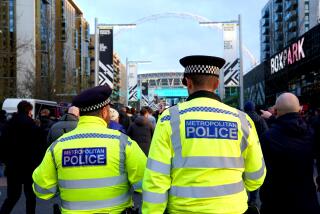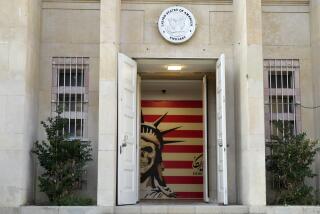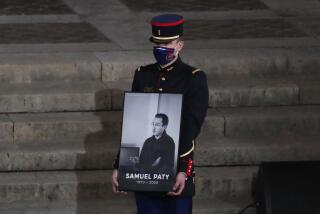YouTube star uses comedy to help police combat Islamic State
A key weapon in Britain’s fight against radicalization wears a beanie hat with a bobble on top, a hoodie and personalized sneakers.
He has no formal counter-terrorism training and employs language peppered with slang.
Humza Arshad, a 29-year-old YouTube star, never imagined himself as a spokesman for the Muslim community, especially not someone called upon to counter the extremist narrative of Islamic State.
Yet that is precisely the situation in which this British-born Muslim from south London finds himself.
Arshad has been recruited by London’s Metropolitan Police to speak at schools about the dangers of radicalization, bringing an offbeat blend of comedy and sincerity topped with a knowing background and cultural sensitivity.
“How many people are Muslim?” he asked the 13- to 15-year-old students packed into Whitefield School’s assembly hall in North London on a recent Tuesday morning.
About one-third of the pupils raised a hand.
“We can take over, guys!” he hollered back in his strong London accent. “Sharia law coming through!”
As the schoolchildren erupted in laughter, he smiled and quipped, “Just kidding. I think we scared the white people.”
Arshad has an unconventional approach, but in recent months has become a vital part of the Metropolitan Police’s strategy to stem the flow of young British Muslims migrating to Syria and Iraq.
Officials estimate that as many as 600 have made the journey into Islamic State-controlled territory, and there has been a surge in the number of young women lured by the extremists.
It’s a mission that Arshad became involved in because of the success of his “Diary of a Badman” YouTube videos, but one that inadvertently became personal.
When three teenage schoolgirls from East London left home for Syria in February, Arshad discovered he knew the brother of one.
As he shared this personal anecdote with the students at Whitefield School, a hush fell over the room.
“They’re just a normal family,” he explained somberly. “If I could’ve done this a couple months ago and stopped those three girls from going, I would have, because it’s completely ruined their families.”
Arshad has a cultural fluency that gives his message legitimacy and authority. But a joke is never far from his lips.
He talks about extremists trying to prove their devotion by having “beards down to their belly buttons” and how hard it is to be a Muslim these days because of negative stereotyping.
“Muslim this and terrorist that,” he said. “Muslim dog attacks grass.”
More laughter reverberated and the teens gave one another knowing nods.
“It worked because he makes it personal,” said 18-year-old student Saif Butt, who attended the assembly. “It feels like he actually wants to make a difference. I can relate to him.”
Despite the serious undertones, students were playful when Arshad opened the room to questions.
“Can you take off your hat?” one boy asked. “How much were your shoes?” another chimed in.
“What car do you drive?” said a third.
Then a girl wearing a head scarf lifted her hand and asked bashfully, “Can I have a hug?”
“You stole my wallet!” Arshad teased after their quick embrace, and again the hall filled with laughter, then cheers when he took a massive group selfie.
Arshad was raised by Pakistani parents in South London and says the only thing he has ever been good at is making people laugh, leading him to drama school, where “The Dark Knight Rises” star Tom Hardy was one of his instructors.
He started “Diary of a Badman” in 2010 to make a name for himself and, he says, because he didn’t want to be typecast as “Terrorist No. 2 on the plane.”
It turned him into a minor celebrity; his videos have amassed 62 million hits.
They relay the comedic growing pains of a young Asian male who imagines himself a tough guy but often ends up looking a fool.
The episodes tackle dealing with an overbearing mother and his attraction to girls.
But what really caught the eye of the counter-terrorism officer who first thought to get Arshad on board after seeing him on his son’s computer was that each of Arshad’s episodes ended with a positive moral message. That made him a positive role model.
“It was a light-bulb moment,” said Rizwaan Chothia, also a British-born Muslim, who works for the East Midlands police’s special operations unit. “There’s nothing else like it out there.”
He approached Arshad about making a video about radicalization and the 13-minute film now is shown at schools even when the actor cannot be there in person.
“We do a lot of work with young people to challenge the ideology, and it’s really important to get in there early doors,” Chothia said, adding that having Arshad on the police’s team served as a crucial turning point in that strategy.
“We’ve actually got somebody with real credibility, rather than just the police.”
Arshad has visited more than 40 London schools, including Quintin Kynaston School in West London where Mohammed Emwazi, the Islamic State executioner dubbed “Jihadi John,” once was a student.
“We could stand up in assembly and talk to the children, but to have somebody that they relate to is much more powerful,” said Elizabeth Rymer, principal of Whitefield School, who described the ethnic mix of her student body as a “microcosm of London.” More than 70 languages are spoken, and 45% of the students are Muslim.
Jonathan Russell, political liaison officer at the Quilliam Foundation think tank, said Arshad’s strength is his ability to talk “on the right level with the right audience.”
But he questioned why this sort of approach was not implemented sooner.
“There hasn’t been, up to this point, a coordinated approach for dealing with schools. Lots has happened in an ad hoc way,” he said.
The timing of the talks appears particularly critical as each week brings new tales of Brits seeking to cross the Turkish border into the war zone.
For Arshad, it’s become an unusual yet rewarding twist of fate.
“You can either be part of the problem, or do your utmost to fix the problem,” he said.
Before leaving the room, he told the youngsters that he wants to be an example of a Muslim “standing up and doing something positive as well.”
“Our religion is a beautiful religion,” he said. “We are not the stereotype we are led to believe.”
Boyle is a special correspondent.
More to Read
Start your day right
Sign up for Essential California for news, features and recommendations from the L.A. Times and beyond in your inbox six days a week.
You may occasionally receive promotional content from the Los Angeles Times.






